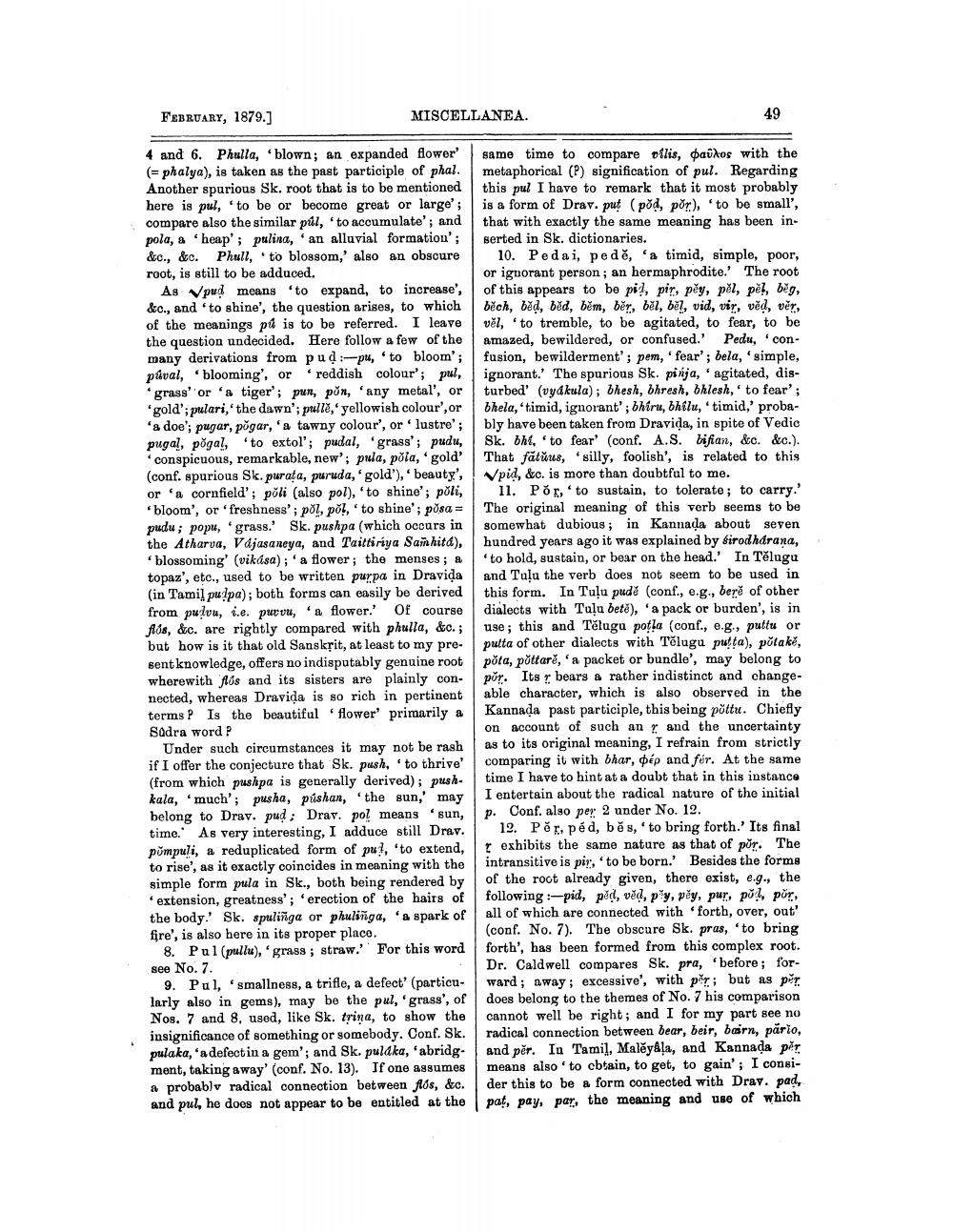________________
FEBRUARY, 1879.]
MISCELLANEA.
49
4 and 6. Phulla, 'blown; an expanded flower' (=phalya), is taken as the past participle of phal. Another spurious Sk, root that is to be mentioned here is pul, to be or become great or large'; compare also the similar pål, 'to accumulate'; and pola, a 'heap'; pulina, an alluvial formation'; &c., &c. Phull, 'to blossom,' also an obscure root, is still to be adduced.
As pud means to expand, to increase', &c., and to shine', the question arises, to which of the meanings pa is to be referred. I leave the question undecided. Here follow a few of the many derivations from pud :-pu, 'to bloom'; pával, blooming', or reddish colour'; pul,
grass' or 'a tiger'; pun, pờn, 'any metal', or 'gold'; pulari,' the dawn'; prill8,' yellowish colour', or
a doe'; pugar, pogar, 'a tawny colour', or 'lustre'; pugal, poga!, 'to extol'; pudal, 'grass'; pudu, *conspicuous, remarkable, new'; prila, pola, gold' (conf. spurious Sk.purata, puruda, gold'), 'beauty', or 'a cornfield'; põli (also pol), 'to shine'; póli, bloom', or 'freshness'; pol, pol, to shine'; pěsa = pudu; popu, grass. Sk. pushpa (which occurs in the Atharva, Vajasaneya, and Taittiriya Samhita),
blossoming' (vikasa); a flower; the menses; a topaz', etc., used to be written purpa in Dravida (in Tamil pulpa); both forms can easily be derived from pulvu, i.e. purvu, a flower. Of course flos, &c. are rightly compared with phulla, &c.; but how is it that old Sanskrit, at least to my present knowledge, offers no indisputably genuine root wherewith flos and its sisters are plainly connected, whereas Dravida is so rich in pertinent terms P Is the beautiful flower' primarily a Sodra word ?
Under such circumstances it may not be rash if I offer the conjecture that Sk. push, 'to thrive' (from which pushpa is generally derived); pushkala, 'much'; pusha, púshan, the sun,' may belong to Drav. pud; Drav. pol means 'sun, time. As very interesting, I adduce still Drav. pūmpuli, a reduplicated form of pu, 'to extend, to rise', as it exactly coincides in meaning with the simple form pula in Sk., both being rendered by * extension, greatness'; 'erection of the hairs of the body.' Sk. spulinga or phuliñga, '& spark of fire', is also here in its proper place.
8. Pul (prallu), 'grass ; straw. For this word see No. 7.
9. Pul, smallness, a trifle, a defect' (particularly also in gems), may be the pul, grass', of Nos, 7 and 8, used, like Sk. trina, to show the insignificance of something or somebody. Conf. Sk. pulaka, 'a defect in a gem'; and Sk. puldka, 'abridge ment, taking away' (conf. No. 13). If one aggumes a probably radical connection between flos, &c. and pul, he does not appear to be entitled at the
same time to compare oflis, païkos with the metaphorical (P) signification of pul. Regarding this pul I have to remark that it most probably is a form of Drav. put (pod, por), 'to be small', that with exactly the same meaning has been inserted in Sk. dictionaries.
10. Pedai, pede, 'a timid, simple, poor, or ignorant person; an hermaphrodite.' The root of this appears to be pid, pir, pey, pol, pe!, beg, běch, běd, bod, běm, běr, bei, bel, vid, vir, ved, věr, věl, to tremble, to be agitated, to fear, to be amazed, bewildered, or confused.' Pedu, .confusion, bewilderment'; pem, 'fear'; bela, simple, ignorant.' The spurious Sk. pinja, agitated, disturbed' (vydkula); bhesh, bhresh, bhlesh, to fear'; bhela, 'timid, ignorant'; bhíru, bhílu, timid,' probably have been taken from Dravida, in spite of Vedic Sk. bhí, to fear' (conf. A.S. bifian, &c. &c.). That fātīus, silly, foolish', is related to this Vpid, &c. is more than doubtful to me.
11. Por, to sustain, to tolerate; to carry.' The original meaning of this verb seems to be somewhat dubious; in Kannada about seven hundred years ago it was explained by sirodhdrana,
to hold, sustain, or bear on the head.' In Telugu and Taļu the verb does not seem to be used in this form. In Tuļu pude (conf., e.g., bero of other dialects with Tulu betš), 'a pack or burden', is in use; this and Telugu potla (conf., e.g., puttu or putta of other dialects with Tělugu putta), pólake, pota, pottard,' a packet or bundle', may belong to păr. Its , bears a rather indistinct and changeable character, which is also observed in the Kannada past participle, this being põttu. Chiefly on account of such an r and the uncertainty as to its original meaning, I refrain from strictly comparing it with bhar, pép and fér. At the same time I have to hint at a doubt that in this instance I entertain about the radical nature of the initial p. Conf. also per 2 under No. 12.
12. Por, péd, bě s, 'to bring forth.' Its final t exhibits the same nature as that of pũr. The intransitive is pir, 'to be born.' Besides the forms of the root already given, there exist, e.g., the following :-pid, pod, věd, ply, pěy, pur, pů?, por, all of which are connected with 'forth, over, out' (conf. No. 7). The obscure Sk. pras, 'to bring forth', has been formed from this complex root. Dr. Caldwell compares Sk. pra, before; forward ; away: excessive', with pår; but as por does belong to the themes of No. 7 his comparison cannot well be right; and I for my part see no radical connection between bear, beir, bairn, părio, and per. In Tamil, MalěyAļa, and Kannada por means also to obtain, to get, to gain'; I consider this to be a form connected with Drav. pad, pat, pay, par, the meaning and use of which




